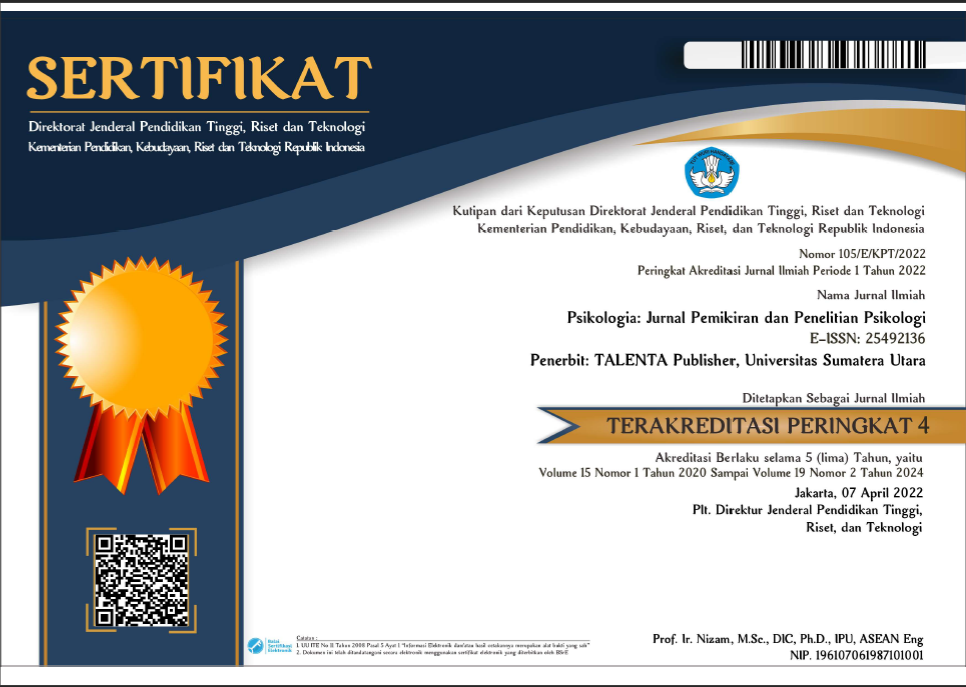Correlation of instagram usage intensity, fear of missing out, and subjective well-being among university students
Hubungan antara intensitas penggunaan instagram, fear of missing out, dan kesejahteraan subjektif pada mahasiswa
DOI:
https://doi.org/10.32734/psikologia.v18i2.10962Keywords:
instagram usage intensity, fear of missing out, subjective well-beingAbstract
This study aimed to determine the correlation between Instagram usage intensity and fear of missing out on the subjective well-being of This study aimed at fifty-three university students in Surabaya are involved as respondents. Data was collected using accidental sampling and data analysis techniques using multiple linear regression. The results of the study show that there is a relationship between Instagram usage intensity and fear of missing out on subjective well-being.
Downloads
References
Ayyash-Abdo, H., & Alamuddin, R. (2007). Predictors of subjective well-being among college youth in Lebanon. Journal of Social Psychology, 147(3). https://doi.org/10.3200/SOCP.147.3.265-284
Brailovskaia, J., Schillack, H., & Margraf, J. (2020). Tell me why are you using social media (SM)! Relationship between reasons for use of SM, SM flow, daily stress, depression, anxiety, and addictive SM use – An exploratory investigation of young adults in Germany. Computers in Human Behavior, 113, 106511. https://doi.org/10.1016/j.chb.2020.106511
Chen, H. T., & Li, X. (2017). The contribution of mobile social media to social capital and psychological wellbeing: Examining the role of communicative use, friending and self-disclosure. Computers in Human Behavior, 958–965.
Deniz, M. (2021). Fear of missing out (FoMO) mediate relations between social self-efficacy and life satisfaction. Psicologia: Reflexao e Critica, 34(1). https://doi.org/10.1186/s41155-021-00193-w
Diener, E. (2000). Subjective well-being: The science of happiness and a proposal for a national index. American Psychologist, 55(1). https://doi.org/10.1037/0003-066X.55.1.34
Diener, E., & Ryan, K. (2009). Subjective well-being: A general overview. South African Journal of Psychology, 39(4). https://doi.org/10.1177/008124630903900402
Drakel, Januarti. W., Pratiknjo, M. H., & Mulianti, T. (2018). Perilaku Mahasiswa Dalam Menggunakan Media Sosial di Universitas Sam Ratulangi Manado. Journal Unair, (21).
Kemp, S. (2022a, Februari). Digital 2022: Global Overview Report—DataReportal – Global Digital Insights. Diambil dari https://datareportal.com/reports/digital-2022-global-overview-report
Kemp, S. (2022b, Februari). Digital 2022: Indonesia—DataReportal – Global Digital Insights. Diambil dari https://datareportal.com/reports/digital-2022-indonesia
Marsya, T., Petrawati, B. A., & Handayani, P. (2022). Hubungan fear of missing out dengan subjective well-being pengguna sosial media dewasa awal | Jambi Medical Journal “Jurnal Kedokteran dan Kesehatan.†10. Diambil dari https://online-journal.unja.ac.id/kedokteran/article/view/19248
Myers, D. G., & Diener, E. (1995). Who is happy? Psychological Science, 6(1). https://doi.org/10.1111/j.1467-9280.1995.tb00298.x
Oberst, U., Renau, V., Chamarro, A., & Carbonell, X. (2016). Gender stereotypes in Facebook profiles: Are women more female online? Computers in Human Behavior, 60. https://doi.org/10.1016/j.chb.2016.02.085
Proctor, C. (2014). Subjective Well-Being (SWB). Dalam Encyclopedia of Quality of Life and Well-Being Research. https://doi.org/10.1007/978-94-007-0753-5_2905
Przybylski, A. K., Murayama, K., Dehaan, C. R., & Gladwell, V. (2013). Motivational, emotional, and behavioral correlates of fear of missing out. Computers in Human Behavior, 29(4). https://doi.org/10.1016/j.chb.2013.02.014
Stanculescu, E. (2020). Does active social media use improve subjective well-being? - a mediation model. The 16th International Scientific Conference eLearning and Software for Education, 259–266. https://doi.org/10.12753/2066-026X-20-033
Taqwa, M. I. (2018). Intensitas Penggunaan Media Sosial Instagram Stories dengan Kesehatan Mental (Skripsi). Universitas Muhammadiyah Malang, Malang.
Tekeng, St. N. Y., & Alsa, A. (2016). Peranan Kepuasan Kebutuhan Dasar Psikologis dan Orientasi Tujuan Mastery Approach terhadap Belajar Berdasar Regulasi Diri. Jurnal Psikologi, 43(2). https://doi.org/10.22146/jpsi.22856
Downloads
Published
How to Cite
Issue
Section
License
Copyright (c) 2023 Psikologia: Jurnal Pemikiran dan Penelitian Psikologi

This work is licensed under a Creative Commons Attribution-ShareAlike 4.0 International License.








